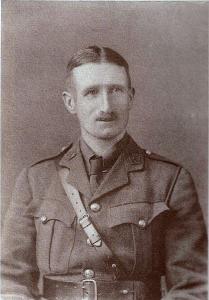
|

|
| Lieutenant Herbert George ANDREWS | |
|
16th (Service) Battalion Middlesex Regiment (Public Schools) Date of birth: 27th August 1869 Date of death: 19th April 1917 Killed in action aged 47 Buried at Beaurains Road Cemetery Row B Grave 2 |

|
| Herbert George Andrews was born at East Molesey in Surrey on the 27th of August 1869 the son of Herbert Andrews, a timber merchant, and Louisa (nee Lock) Andrews later of Crawley in Sussex. He was christened at St Paul's Church, East Molesey on the 9th of October 1869. He was educated at Lancing College where he was in School House from September 1883 to July 1887. He was a member of the Football XI in 1886 and 1887. On leaving school he became a timber merchant and later he went into farming at Poles Farm, Crawley in Sussex. He served for three years in the 3rd East Surrey Volunteers. He was married on the 23rd of August 1893 at St Mary's Church, East Molesey to Dorothy (nee Thornley); they had three children Barbara, Thomas and Audrey. At the time of his death she was living at Meads Place, Eastbourne in Sussex. On the outbreak of war he enlisted at 24 St James Street in London as Private 346 in the 16th Battalion Middlesex Regiment on the 11th of September 1914 where his son was an officer. He was posted to Woldingham where he acted as batman for Captain George Heslop OL. He was promoted to Lance Corporal on the 13th of January 1915 and to Corporal and to Sergeant on the 6th of March 1915. He applied for a commission on the 15th of March 1915 in an application which was supported by the Reverend Arthur Budge, Rector of Worth. He was commissioned as a 2nd Lieutenant in the 16th Battalion Middlesex Regiment on the 16th of March 1915 where he became Transport Officer. On the 14th of April 1917 the 16th Battalion Middlesex Regiment took over front line trenches at Monchy and spent several days there constructing new defences in the village. This period in the line cost them 1 officer wounded with 7 other ranks killed and 59 wounded. Herbert Andrews was not in the front line during this period but was in the reserve line. On the 17th of April he went to the forward area to meet them as they came out of the line, as he had done many times before, and was killed by a shell. His wife received the following telegram dated the 22nd of April 1917: - "Deeply regret to inform you Lieut. H.G. Andrews Middlesex Regiment was killed in action April nineteenth. The Army Council express their sympathy." He was mentioned in Sir Douglas Haig's despatches of the 9th of April 1917. The Battalion Quartermaster Sergeant wrote:- We have all known "Daddy" and worked with him since the formation of the Battalion, and his death leaves a big gap in the ranks of the "old hands" that are left." Lieutenant and Quartermaster R.A. Pye wrote:- "He always did his job, and more than his job, and was ever ready to help everybody. Not only in our own Battalion, but throughout the Brigade, he was well known and well liked, and the loss we have sustained causes keen regret to all who knew him. "Daddy" was killed by a shell on the road near the line early on the morning of the 20th (sic). The funeral was attended by all his men and all the officers of the Battalion." The Battalion Adjutant, Captain James wrote:- "Personally, the loss of his cheery presence is more marked every day, as he and I have been in the same mess and often shared the same room for many months, and I had the honour of considering him one of my best friends out here. The great pity is that his strict sense of duty took him out that fateful night, when as he said at the time "I've met the Battalion coming out of the line every time up to now and I am not going to miss it this time. Either I am going to see the end of the war or the war is going to see the end of me." And that was Daddy all over. I can assure you that a gloom was cast over the whole Division because Daddy was the best known Regimental Officer in it. Everyone who was anybody knew Daddy Andrews of the Middlesex." His Colonel wrote:- "I am sorry to say I am away from the Battalion at present in hospital; your husband's death was the last straw which broke me up. I put it very personally; I have lost a good friend and a loyal and reliable officer. He took a great load off my shoulders. I've never had to worry about the transport. I knew in his hands everything would be all right and it always was. He had not his equal as a Transport Officer in this country. His charming personality endeared him to everybody. I suppose he was the best known and best liked officer in the Division." He was buried at Ronville British Cemetery at Arras but his body was exhumed and reburied at its present site in 1920. His wife applied for his medals in November 1920. |
|
| School House |
Back